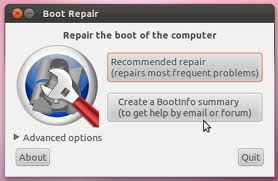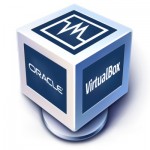23 April 2012 | Computers |
 If you have a dual-boot setup on your computer involving some flavor of linux, at some point you will most likely encounter a problem with GRUB, the linux bootloader.
If you have a dual-boot setup on your computer involving some flavor of linux, at some point you will most likely encounter a problem with GRUB, the linux bootloader.
For example, maybe you used a tool like Paragon Hard Disk Manager Suite to resize your OS partitions. Then you tried to reboot, and you got a GRUB error message followed by the GRUB rescue prompt.
There are several ways to reinitialize GRUB, and most of them involve live CDs and mounting partitions and all kinds of other tricks that will probably make you crazy unless you’re a command-line commando in linux.
Well, I don’t mind the command line, but I also have better things to do.
Fortunately, there is a MUCH easier way to save the day: Boot-Repair!
(more…)
18 February 2011 | Computers |
 Click here to read Part 1!
Click here to read Part 1!
I’m going to assume that you know how to do some basic stuff in Linux. In other words, if you don’t know what a command line is, or how to traverse directories, this might not help you much.
I should also note that my preferred flavor of Linux is Ubuntu. These commands will work on Ubuntu, but I can’t make any guarantees for other distributions. Best to just try them out and see what happens!
Without further ado, here are some more of the top linux tips and tricks that I have gathered over the years…
(more…)
31 December 2010 | Computers, Networking |
 If you’ve ever installed multiple operating systems on your computer, you know what a severe pain it can be when something goes wrong. Even removing one of your multiple OSes can be a hassle when bootloaders get all screwed up.
If you’ve ever installed multiple operating systems on your computer, you know what a severe pain it can be when something goes wrong. Even removing one of your multiple OSes can be a hassle when bootloaders get all screwed up.
For me, the answer to these problems is VirtualBox. VirtualBox is a simple, cross-platform virtualization solution that lets you set aside a chunk of hard disk space, give it a name, and then you just tell it, “I want to install linux here”, pop in your install disc (or whatever), and VirtualBox takes care of the rest. Voila, linux running in a window – inside Windows itself. It’s really handy!
Only one problem: Sometimes when VirtualBox is installed (but not even running), your Windows networking may get REEEEALLY slow. You may not even be able to see other machines on your local network.
Fortunately, there is a very quick and easy way to fix it!
(more…)
18 May 2010 | Programming |
 I like Ubuntu Server. I really like
I like Ubuntu Server. I really like apt-get, because I don’t have to do any work at all to install stuff. It’s a piece of cake.
Unfortunately, sometimes installing using apt-get doesn’t work, or maybe the software I need isn’t the latest and greatest version on the Ubuntu repository. In such cases, there’s only one option left: installing from source.
That means downloading, extracting, configuring, building, debugging, etc. Most people shy away from doing this because it isn’t fast and easy, and stuff can break.
I recently had the opportunity to install the latest version of ImageMagick on an Ubuntu server, and it was a lot easier than I thought it would be!
Here’s how you do it…
(more…)
23 May 2009 | Computers |
 I’m going to assume that you know how to do some basic stuff in Linux. In other words, if you don’t know what a command line is, or how to traverse directories, this might not help you much.
I’m going to assume that you know how to do some basic stuff in Linux. In other words, if you don’t know what a command line is, or how to traverse directories, this might not help you much.
I should also note that my preferred flavor of Linux is Ubuntu. These commands will work on Ubuntu, but I can’t make any guarantees for other distributions. Best to just try them out and see what happens!
Without further ado, here are some of the top linux tips and tricks that I have gathered over the years…
(more…)
2 May 2009 | Computers |
 I’m sure you’ve all heard some hype about 64-bit this and 64-bit that. The thing I read the most is that a 64-bit operating system or piece of software is automagically twice as fast as a 32-bit one. Not so. Worse yet, some operating system vendors market their product as having an “advanced 64-bit architecture”, when the truth of the matter is that their OS is not fully 64-bit.
I’m sure you’ve all heard some hype about 64-bit this and 64-bit that. The thing I read the most is that a 64-bit operating system or piece of software is automagically twice as fast as a 32-bit one. Not so. Worse yet, some operating system vendors market their product as having an “advanced 64-bit architecture”, when the truth of the matter is that their OS is not fully 64-bit.
In any case, most people today are using a 32-bit operating system, but a surprising number have already switched to a 64-bit OS. Or in some cases, a quasi-64-bit OS…
There is one true reason though why you will actually want to switch to a 64-bit OS in the near future: the infamous 3GB barrier. Just what the heck is this mystical barrier, and why should you care?
(more…)
26 March 2009 | Computers |
 Everyone is totally crazy about security these days – especially computer security. We’ve all got antivirus software, a firewall, spyware scanners, and god knows what else loaded up on our PCs to protect ourselves from the “evils” of a networked world.
Everyone is totally crazy about security these days – especially computer security. We’ve all got antivirus software, a firewall, spyware scanners, and god knows what else loaded up on our PCs to protect ourselves from the “evils” of a networked world.
Some of us choose to use certain operating systems that we believe are inherently secure, while the reality is quite different. I remember hearing all about how “ultra-secure” OS X Tiger was in comparison to Windows XP. I know a lot of people who believed this, and who even went out of their way to harp on XP and how insecure it was. Well, there have been numerous updates for Tiger and Leopard that were sent out from Apple HQ. Guess what? There were scores of security vulnerabilities in OS X. What really might shock you is that the vulnerabilities in OS X read like a list of XP security holes (see here and here and here). That’s right, just because Apple tells you OS X is safer doesn’t mean that it’s actually true! Go figure!
Of course, there’s also Linux. In some respects, Linux is safer. In others, it’s no different than XP and OS X. Personally, I prefer Ubuntu and Vista at the moment. But the bottom line is that when it comes to security, it’s up to you to keep your data safe. The first and best way you can do that is to create and use strong passwords!
(more…)
22 February 2009 | Programming |
Say you have an application running on a Linux server using the ext2 or ext3 file systems. You set up a caching scheme in your application to store files like so:
/cache/stamps/1/main_content.cache
/cache/stamps/1/comments.cache
/cache/stamps/2/main_content.cache
/cache/stamps/2/comments.cache
/cache/stamps/3/main_content.cache
/cache/stamps/3/comments.cache
...
Eventually, you’re going to run into a problem: Your caching will stop working since your application won’t be able to write to the “stamps” directory any more. Instead, you’ll get an error message like this:
Couldn't create cache directory: /stamps/41134/main_content (Too many links - /var/www/your-app/tmp/cache/stamps/41134)
At that point, you’ll try to search for “too many links”, and probably you won’t find much information that is actually comprehensible to normal human beings. Fortunately, it really is quite simple to repair once you understand what’s going on.
(more…)
 If you have a dual-boot setup on your computer involving some flavor of linux, at some point you will most likely encounter a problem with GRUB, the linux bootloader.
If you have a dual-boot setup on your computer involving some flavor of linux, at some point you will most likely encounter a problem with GRUB, the linux bootloader.
 Click here to read Part 1!
Click here to read Part 1! If you’ve ever installed multiple operating systems on your computer, you know what a severe pain it can be when something goes wrong. Even removing one of your multiple OSes can be a hassle when bootloaders get all screwed up.
If you’ve ever installed multiple operating systems on your computer, you know what a severe pain it can be when something goes wrong. Even removing one of your multiple OSes can be a hassle when bootloaders get all screwed up.
 I’m sure you’ve all heard some hype about 64-bit this and 64-bit that. The thing I read the most is that a 64-bit operating system or piece of software is automagically twice as fast as a 32-bit one. Not so. Worse yet, some operating system vendors market their product as having an “advanced 64-bit architecture”, when the truth of the matter is that their OS is not fully 64-bit.
I’m sure you’ve all heard some hype about 64-bit this and 64-bit that. The thing I read the most is that a 64-bit operating system or piece of software is automagically twice as fast as a 32-bit one. Not so. Worse yet, some operating system vendors market their product as having an “advanced 64-bit architecture”, when the truth of the matter is that their OS is not fully 64-bit.

Recent Comments